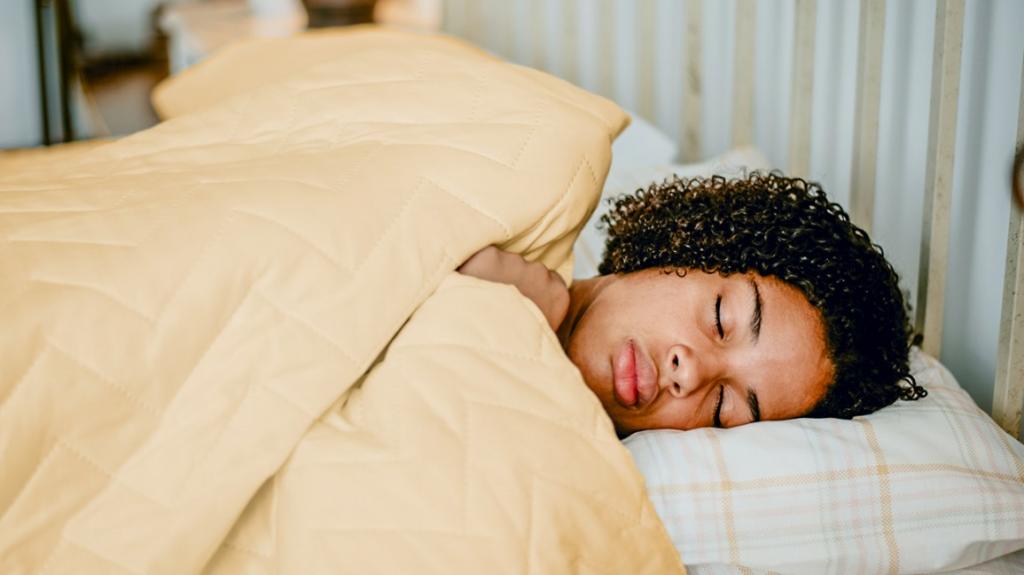Chronic stress or worry, while the body’s natural response to danger, can have a variety of long-term repercussions, including disturbed sleep or even insomnia.
The “fight-or-flight” response is triggered by stress. Heart rate and breathing speed up as stress chemicals are released. It’s a form of stress that persists after the stressor is gone, and it has the same physiological effects.
Reducing stress and anxiety can be accomplished through the use of relaxation techniques. Slower heart rate and breathing, lower blood pressure, and a relaxed state of mind are all signs of relaxation.
Best Tips for Relieving Nighttime Stress
Before bedtime, there are several ways to alleviate stress and anxiety. These methods can help you unwind if you’re having trouble sleeping because you’re too stressed out. Some people simply use one or two of these methods to help them relax before going to sleep, while others use a combination. Your doctor can help you identify the best course of action if stress and sleep are a problem for you on a regular basis.

Meditation
Meditation is a mental and physical discipline that allows thoughts to come and go without judging them. Using meditation as a treatment for insomnia is a well-known method. There are many different kinds of meditation.
- Mindfulness As thoughts, sensations, and emotions pass by, one observes them without judging them. Being able to stay focused on the here and now and not allow your mind to wander is a significant component of this. If you’re new to meditation, this may seem tough at first, but with time and practice, it will become second nature. Adults have been shown to experience less sleepiness as a result.
- It’s a practice of slowly scanning the body and noticing any sensations or pains that arise. One at a time, focus on a certain region of your body to perform this method. Both a methodical scanning from head to toe or a more haphazard scanning of the body parts connecting with the floor can be done. Allow yourself to be entirely absorbed in your physical being.
- To practice guided meditation, a person is instructed to imagine a peaceful place and to close their eyes. Music and environmental sounds can be incorporated into these guided meditations to further enhance the experience of relaxation. Many popular apps, such as Headspace and Calm, offer guided meditations.
A meditation session can be done at any moment before you go to sleep as well as while you sleep, if necessary.
Deep Breathing
In addition to meditation, deep breathing can be used as a relaxation technique at any time. Breathing slowly, evenly, and deeply is the goal.
Deep breathing can be practiced in a variety of ways, from the 4-7-8 method to lion’s breath, but getting started doesn’t have to be complicated. Begin by carefully inhaling while placing one hand on your stomach. When your stomach begins to rumble, hold your breath for a few seconds before slowly exhaling. Counting breaths and varying the amount of time between inhalation and exhalation are two methods that practitioners may use.
Meditative Movement
Focused breathing and moderate physical movement are incorporated into the meditative motion. All of these meditative motions are yoga, tai chi, and qigong. Because they don’t require any specific equipment, they can be done anywhere, making them accessible to the average individual.
Several studies have found yoga to have a variety of physical and mental health advantages. Yoga can help alleviate sleep issues in addition to fostering good activity habits. Yoga has been demonstrated to improve stress management, as well as mental well-being and the intensity of some physical symptoms.
Other forms of mobility have received less attention. In the meanwhile, preliminary studies demonstrate that tai chi and qigong can both help with emotional well-being in their own ways. Anxiety and depression are among the conditions that can be treated. Practitioners of these techniques may also experience better sleep as a side effect of their improved ability to cope with anxiety.
If you want to include these meditation exercises into your daily routine, you can easily do so at night or during the day. Mindfulness and breathing exercises can help those who have trouble sleeping at night, even if the motions themselves aren’t optimal.

Progressive Relaxation
Because it necessitates focusing on specific parts of the body, progressive relaxation resembles body scan meditation. You begin with your toes, feet, calves, and so on, contracting and releasing your muscles sequentially. You can use this to alleviate any physical tensions or stress you may be experiencing.
Biofeedback
Using an electronic instrument, biofeedback helps patients learn to better control their bodies. Blood pressure, pulse rate, and muscular activity can all be monitored with the help of these gadgets. To interpret the results, users will require the help of a therapist or biofeedback training. In addition, they’ll discover how alterations in the body’s functioning are brought about. The use of biofeedback can help persons suffering from stress, anxiety, or insomnia to identify and regulate the functions they’re concerned about.
In the event of a medical issue, relaxing techniques should not be used in place of medical assistance.
Stress Relief During Your Nighttime Routine
However, there are many more methods that can be incorporated into your bedtime regimen.
- Create a comfortable sleeping space. Take a look around your bedroom to see if there are any potential stressors. A peaceful night’s sleep can only be achieved in a quiet, dark room.
- Restrict your intake of alcohol and caffeine, respectively. Both have the potential to interfere with a good night’s rest. The body’s ability to cope with stress might be harmed by drinking too much alcohol.
- Take a nice, relaxing bath or shower to relax your muscles. Relaxation and de-stressing are not the only benefits of this, but it can also help you fall asleep faster.
- Make sure you don’t expose yourself to blue light before bedtime. Phone, computer, and television screens all emit blue light, which might mess with your circadian clock. When it’s time to wind down for the night, experts suggest putting these things away. In addition, this can help curb the behavior of doomscrolling, which has been linked to worry.
- Take care of your sleep habits.
- Journal. In order to deal with the issues you’re facing, it’s important to write them down. In the moments before you go to sleep, write down any feelings of anxiousness that arise. It’s also a good idea to jot down a list of things you need to accomplish the next day.
- Set aside time each day to reflect about your worries. Cognitive-behavioral therapy employs a technique known as “worry time” (CBT). To accomplish this, choose a specific time of day during which you will obsess about everything that is on your plate. This is a way to get to the root of the problem before it gets out of hand.
Good Daytime Habits for Relieving Nighttime Stress
There are things you can do during the day to relieve stress at night, in addition to relaxation techniques. Exercise during the day is a popular assistance. Exercise during the day has been shown to improve sleep quality in patients with generalized anxiety disorders, in addition to its other health advantages. Insomnia, for example, may be alleviated by regular physical activity. Another way to maintain good sleep hygiene is to set a regular wake-up time. Regular waking times are important for good sleep hygiene even on the weekends, as research has shown.
It’s important to keep in mind that you won’t be able to go to sleep unless you’re calm and relaxed. Consistent use of relaxation techniques, on the other hand, may have a long-term beneficial effect. Consult your doctor if you have any questions or concerns about which strategy is best for you.
How to Stress Less
In order to avoid disrupting your sleep, there are a number of ways that you can manage your stress. Relaxing and winding down before bed is essential to getting a good night’s sleep and reducing the stress of the day. Before you go to sleep, take some time to yourself and clear your mind of the day’s worries. A relaxing massage, a warm bath, or light stretches before bed can all help you sleep better. Even scented candles or herbal teas might help you unwind. Take a look at these products evaluated and rated by sleep experts: essential oils, balms, pillows, and herbal beverages. Relaxation and sleep induction can both be facilitated by these quiet pursuits. As a sleep aid, the following bedtime rituals can help alleviate nighttime anxiety.
- Decide. Prior to going to sleep, try to work through any issues on your mind. Set aside a time during the day to deal with the stress you’re experiencing, and make bedtime a worry-free zone. Keep a notepad on your bedside table so that you can write down your worries and put them to rest before you go to sleep.
- Stay on track. The stress of the day can be lessened by keeping your office, home, and car tidy. When you can’t find an important paper or the car keys because of clutter, you may feel overwhelmed and stressed.
- Start meditating today! Meditation has been shown to help alleviate stress and enhance sleep quality.
- Be thankful for what you have. Stress can be reduced by taking a moment each day to express gratitude for the things that bring you joy. Make it a habit to express gratitude for the good things that transpired during the day before going to sleep.
- Improve your mental health by engaging in mental exercises. It’s possible to break the sleep-robbing loop of worrying thoughts by engaging in a mind problem.
Breathing exercises may help. The practice of deep breathing helps reduce stress. Relax by inhaling for four counts, holding your breath for four counts, then expelling for eight counts.
Stress will always be a part of our life, let’s face it. Also, a little tension is good for you. The stress hormone cortisol actually aids in your search for happiness and your escape from dangerous situations. If you’re having trouble sleeping, all it takes is a little research to figure out what’s causing the problem. Making sure you get enough sleep each night is the first step toward managing stress in a healthy way. You may stop the sleep-stress cycle by paying attention and practicing, which will help you both feel better and sleep better.
Using the free SleepScore App, you can track your progress in improving your sleep quality and quantity, as well as your overall quality and amount of sleep. SleepScore Premium comes with personalized recommendations, goals, and challenges, but you can try it for free for seven days to see whether it’s for you (for a limited time).
What’s Keeping You Awake?
As a result, you may not be able to get a good night’s rest if you’re feeling anxious or agitated. Anxiety also causes you to wake up and go back to sleep frequently throughout the night. When you’re stressed, you may sleep less and sleep less efficiently.

This sleep-stress link is characterized by a number of physiological shifts. Cortisol, a hormone that increases alertness and vigilance while also elevating heart rate and blood pressure, is released when people are under stress. Cortisol levels tend to drop in the evening as part of the body’s natural preparation for sleep by lowering cortisol levels. The release of melatonin, a hormone that regulates sleep-wake cycles, is disrupted by high levels of cortisol at night. When you don’t get enough sleep, your levels of cortisol can rise at times when they should be lower.
When you’re stressed out, it’s hard to get a good night’s sleep. If you’re feeling stressed, you’re more likely to be awake for longer periods of time in REM sleep. In the REM period of sleep, the brain processes emotions and memories and restores mental function. Normal patterns of brain waves in REM and other stages of sleep are disrupted by these alterations to your sleep architecture. The brain waves involved in attention, creativity, and daydreaming can all be affected by stress. In addition to disrupting regular sleep cycles and mood, excessive REM sleep can cause daytime sleepiness and weariness.
How Can Sleep Reduce Stress?
Stress-relieving sleep is a valuable tool. Maintaining a regular sleep schedule helps to soothe and rejuvenate the body, as well as enhance cognition, emotional regulation, and judgment and decision-making abilities. When you’re well-rested, you’re better at solving problems and handling stress. In contrast, a lack of sleep depletes your vitality and impairs your cognitive function.
If you don’t get enough sleep, you may find it difficult to concentrate. Lack of sleep increases emotional reactivity, impulsivity, and sensitivity to unpleasant stimuli, according to research. Sleep-related cognitive deficits can cause stress in a variety of ways, from interfering with personal and professional relationships to affecting one’s job performance.
What do you think?

![Top Rated CPAP Machine Buyer’s Guide [current_date format=’m/Y’]](https://bestpillowsleepers.com/wp-content/uploads/2023/03/best-cpap-machine-img_6405d72310053-400x300.jpg)
![The 11 Best Cooling Weighted Blankets [current_date format=’m/Y’]](https://bestpillowsleepers.com/wp-content/uploads/2023/01/best-cooling-weighted-blankets-img_63d4ff15c615d-400x300.jpg)
![Ultimate Guide to Choosing a Best Cooling Mattress Pads [current_date format=’m/Y’]](https://bestpillowsleepers.com/wp-content/uploads/2023/01/best-cooling-mattress-pads-img_63c403115126b-400x300.jpg)
![Ultimate Guide to Choosing a Best Cooling Mattress [current_date format=’m/Y’]](https://bestpillowsleepers.com/wp-content/uploads/2023/01/ultimate-guide-to-choosing-a-best-cooling-mattress-img_63bcdba870d77-400x300.jpg)
![Ultimate Guide to Choosing a Best Cooling Comforters [current_date format=’m/Y’]](https://bestpillowsleepers.com/wp-content/uploads/2023/01/ultimate-guide-to-choosing-a-best-cooling-comforters-img_63bba2f5cd3ce-400x300.jpg)